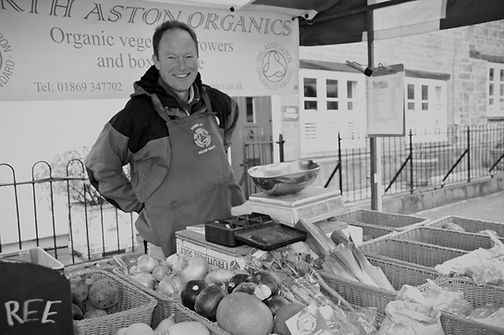%20bw_jfif.jpg)

Our Story
North Aston Organics was started by Mark and Ginny Stay. After numerous false starts (chartered surveying, the army, pharmaceutical packing, and selling juggling balls on Eastbourne pier), Mark thought he would turn his allotmenteering hobby into a job. Five years later, after working with various horticulture projects, we were ready to start, but where? Well, to cut a long story short, we found some land to rent with a supportive landowner and got stuck in.
Like most people starting a business, we were blindly optimistic, but we had 'done the course' and gained some experience. The fact that we had a two-year-old in tow and another baby on the way meant failure was not an option. Also, they say career paths often skip a generation, so we were hoping a bit of green fingered-ness would be inherited from Ginny's Kentish fruit growing grandparents and Mark's Isle of Wight gardener grandfather.
And suddenly more than 25 years have passed and here we are, still growing as wide a range of vegetables as possible, from Aubergines to Zucchini (sorry, courgettes, but what else begins with 'z'?). And now we have a great team working alongside us – seven people both full- and part-time, who share the same drive to grow delicious, healthy vegetables, and sell them locally.
The Market Garden
As our name suggests, we are in the village of North Aston, just south of Deddington, Oxfordshire. We grow across three different sites in North Aston. At the heart of the village, we have a site with light soils, which is great for early crops. It is also home to our glasshouse, where we raise all our plants from seeds, and a small vegetable stall, where you can pick up freshly harvested produce. Our field-scale site, Mill Field (or, more colloquially, “down the road”) has a southerly aspect, overlooking the Cherwell Valley, as well as excellent fertility, making it well-suited for growing our main crops. Lastly, our main polytunnel is located “up the road”, benefitting from a plot with level ground and day-long sun – it’s the ideal spot for our tomatoes in the summer, as well as hardy leafy greens in the winter.


Why Organic?
Taking its name from the organic matter used as an alternative to synthetic fertilisers, organic farming takes a holistic, principled approach that respects and harnesses the power of natural processes to build positive health across the ecology of the farm.
In the face of climate change, diet related ill-health and widespread decline in wildlife, the need to change our food systems has never been greater – a transition towards 'agroecological' farming systems, like organic, can make a world of difference. As farmers have long demonstrated, organic is better for the planet, its people, and its wildlife.
Organic farming methods offer the best, currently available, practical model for addressing climate-friendly food production. This is because it is less dependent on oil-based fertilisers and pesticides and confers resilience in the face of climatic extremes. It also stores higher levels of carbon in the soil. In fact, if Europe’s farmland all followed organic principles, agricultural emissions could drop by 40-50% by 2050.
Additionally, organic farms are havens for wildlife and provide homes for bees, birds & butterflies. On average, plant, insect and bird life is 50% more abundant on organic farms, where, additionally, there are around 75% more wild bees.
For more information, please visit the Soil Association.
The Wider Farm
We work in partnership with North Aston Farms, an organic 900-acre farm, raising beef and dairy cattle, and sheep, with a small acreage devoted to arable crops.
For more information, see here.
